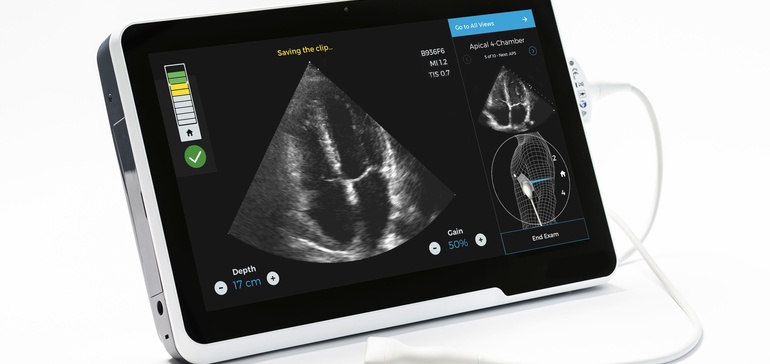Dive Brief:
- Health tech giant Philips and diagnostic imaging startup Caption Health announced FDA clearances this week for ultrasound tools they say could aid healthcare professionals in point-of-care imaging for patients infected with the novel coronavirus.
- Philips said Wednesday it received 510(k) clearance to market a range of its existing ultrasound products specifically for management of COVID-19-related lung and cardiac complications. Caption, which in February gained De Novo authorization for the first AI tool to help non-specialists take good-quality cardiac ultrasounds, said Tuesday FDA OK’d a software update ahead of schedule to enable more extensive guidance to healthcare providers wanting to take ultrasounds.
- The clearances coincided with Wednesday’s news that healthcare system Atrium Health has deployed mobile startup Butterfly Network’s point-of-care ultrasound device at COVID-19 testing centers and other high-priority sites.

-
Dive Insight:
The presence of cardiac complications has been a key datapoint in the triaging of COVID-19 patients since research on people hospitalized in Wuhan, China, identified it as a notable mortality risk factor. With healthcare systems stretched by the pandemic, the challenge is to effectively address that risk factor by quickly identifying and treating patients with cardiac complications.
In that vein, FDA has made a flurry of decisions to increase access to relevant tools. On Monday, FDA gave emergency use authorization to a cardiac dysfunction detection algorithm marketed by Eko.
A day later, Caption said FDA cleared an update to its software that walks users through the process of capturing ultrasound images. According to Caption, FDA took 25 days to review the update.
The significance of the update to the management of coronavirus stems from the potential for the software to enable people without specialized echocardiography training to capture images of the heart at the point of care. In doing so, the software could reduce the need for sonographers to image COVID-19 patients, thereby limiting the number of healthcare workers exposed to the virus.
Similarly, Philips posted a notice Wednesday about the 510(k) clearance of a range of ultrasound products and software for use specifically in the imaging of COVID-19 patients. Philips, which posted guidance to healthcare providers in conjunction with the clearance, highlighted its handheld scanner and associated mobile app as devices of particular value in the response to the pandemic.
News of the FDA clearances emerged around the same time as details of the expanded use of an existing ultrasound device. Butterfly said Atrium Health, a healthcare system with more than 40 hospitals, is using its portable whole-body ultrasound device Butterfly iQ at more than 30 locations, including COVID-19 testing centers, emergency departments and intensive care units.
Like other providers of ultrasound devices, Butterfly has seen its technology used to triage COVID-19 patients based on the condition of their hearts and lungs, as well as in ongoing monitoring of people infected with the coronavirus.
